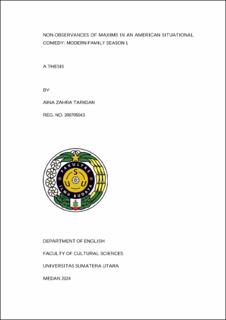Non-Observances of Maxims in an American Situational Comedy: Modern Family Season 1

Date
2024Author
Tarigan, Aina Zahra
Advisor(s)
Mono, Umar
Rangkuti, Rahmadsyah
Metadata
Show full item recordAbstract
This study analyzes the non-observance of Gricean maxims in Modern Family Season 1, utilizing H.P. Grice's theory of the cooperative principle to explore how deviations from these maxims give rise to implicatures that reveal character dynamics. Using Creswell's qualitative analytical framework, the research examines episodes 1-7, identifying 35 instances of non-observance. Flouting accounts for 65.71% of the total, with the Maxim of Manner being flouted most frequently (22.86%), followed by the Maxims of Quantity (17.14%), Relation (14.29%), and Quality (11.43%). Violations represent 31.43%, with the Maxim of Quality being the most violated (20%), while the Maxims of Quantity and Relation each account for 5.71%. There is one instance of infringing the Maxim of Relation (2.86%), and no cases of opting out or suspending. The findings imply that flouting the Maxim of Quantity often conveys exaggerated praise, boasting, or deflection, while flouting the Maxim of Quality implies sarcasm, irony, or indirect criticism. Flouting the Maxim of Relation suggests misunderstanding or avoidance, and flouting the Maxim of Manner introduces ambiguity or obfuscation. Violating the Maxim of Quantity implies withholding information, while violating the Maxim of Quality indicates deception or exaggeration. Violating the Maxim of Relation suggests disengagement or avoidance, and infringing the Maxim of Relation indicates difficulties with conversational norms due to linguistic challenges. These findings demonstrate that deviations from conversational maxims, as outlined in Grice's theory, deepen character interactions and enhance narrative complexity in Modern Family.
Collections
- Undergraduate Theses [842]
